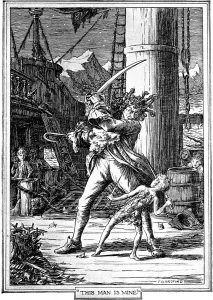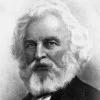Every honorable effort should always be made to avoid war, just as every honorable effort should always be made by the individual in private life to keep out of a brawl, to keep out of trouble; but no self-respecting individual, no self-respecting nation, can or ought to submit to wrong.
Theodore Roosevelt (1858-1919) American politician, statesman, conservationist, writer, US President (1901-1909)
Speech (1910-04-23), “Citizenship in a Republic [The Man in the Arena],” Sorbonne, Paris
(Source)
Quotations about:
fight
Note not all quotations have been tagged, so Search may find additional quotes on this topic.
HOOK: (with curling lip) So, Pan, this is all your doing!
PETER: Ay, Jas Hook, it is all my doing.
HOOK: Proud and insolent youth, prepare to meet thy doom.
PETER: Dark and sinister man, have at thee.
J. M. Barrie (1860-1937) Scottish novelist and dramatist [James Matthew Barrie]
Peter Pan, Act 5 (1904, pub. 1928)
In Barrie's novelization, Peter and Wendy, ch. 15 "Hook Or Me This Time" (1911), this is rendered:“So, Pan,” said Hook at last, “this is all your doing.”
“Ay, James Hook,” came the stern answer, “it is all my doing.”
“Proud and insolent youth,” said Hook, “prepare to meet thy doom.”
“Dark and sinister man,” Peter answered, “have at thee.”
MACBETH: Lay on, Macduff,
And damned be him that first cries “Hold! Enough!”William Shakespeare (1564-1616) English dramatist and poet
Macbeth, Act 5, sc. 8, l. 38ff (5.8.38-39) (1606)
(Source)
If fate means you to lose, give him a good fight anyhow.
A great part of the happiness of life consists not in fighting battles but in avoiding them. A masterly retreat is in itself a victory.
“Why,” said La Belle Isode,”are ye a knight and are no lover? For sooth, it is a great shame to you; wherefore ye may not be called a good knight by reason but if ye make a quarrel for a lady.”
Thomas Malory (c. 1415-1471) English writer
Le Morte d’Arthur, Book 10, ch. 56 (1485)
(Source)
Often paraphrased, "The very purpose of a knight is to fight on behalf of a lady."
Idiot, not to know
his days are numbered who would fight the gods!
His children will not sing around his knees
“Papà! Papà!” on his return from war.Ὅττι μάλ’ οὐ δηναιὸς ὃς ἀθανάτοισι μάχηται,
οὐδέ τί μιν παῖδες ποτὶ γούνασι παππάζουσιν
ἐκ πολέμοιο καὶ αἰνῆς δηϊοτῆτος.Homer (fl. 7th-8th C. BC) Greek author
The Iliad [Ἰλιάς], Book 5, l. 407ff (5.407-409) (c. 750 BC) [tr. Fitzgerald (1974), l. 467ff]
(Source)
Alt. trans.:Not knowing he that fights with Heav’n hath never long to live,
And for this deed, he never shall have child about his knee
To call him father, coming home.
[tr. Chapman (1611), ll. 387-89]No man who fights with gods will live long or hear his children prattling about his knees when he returns from battle.
[tr. Butler (1898)]Know thou, whoe'er with heavenly power contends,
Short is his date, and soon his glory ends;
From fields of death when late he shall retire,
No infant on his knees shall call him sire.
[tr. Pope (1715-20)]Infatuate! he forgets
That whoso turns against the Gods his arm
Lives never long; he never, safe escaped
From furious fight, the lisp’d caresses hears
Of his own infants prattling at his knees.
[tr. Cowper (1791), ll. 474-78]Infatuate! nor does the son of Tydeus know this in his mind, that he is by no means long-lived who fights with the immortals, nor ever at his knees will sons lisp a father’s name, as he returns from war and dreadful battle.
[tr. Buckley (1860)]Unknowing he how short his term of life
Who fights against the Gods! for him no child
Upon his knee shall lisp a father's name,
Safe from the war and battle-field return'd.
[tr. Derby (1864), ll. 463-466]Verily he endureth not for long who fighteth with the immortals, nor do his children prattle about his knees when he is come back from war and the dread conflict.
[tr. Murray (1924)]That man who fights the immortals lives for no long time, his children do not gather to his knees to welcome their father when he returns home after the fighting and the bitter warfare.
[tr. Lattimore (1951)]Doesn't the son of Tydeus know, down deep,
the man who fights the gods does not live long?
Nor do his children ride his knees with cries of 'Father' --
home at last from the wars and heat of battle.
[tr. Fagles (1990), ll. 465-468]
Aravis also had many quarrels (and, I’m afraid even fights) with Cor, but they always made it up again: so that years later, when they were grown up they were so used to quarreling and making it up again that they got married so as to go on doing it more conveniently.
It demonstrated that old adage: never bring a gun to a fight where the other guy has a time-machine and tomorrow’s newspapers.
James Nicoll (b. 1961) Canadian reviewer, editor
“OTT: If ye break faith with us who die,” rec.arts.sf.written, Usenet (27 Apr 2006)
(Source)
‘Twas blow for blow, disputing inch by inch,
For one would not retreat, nor t’other flinch.
Is it not strange that men are so keen to fight for a religion and so unkeen to live according to its precepts?
I don’t beleave in fighting; i am solemly aginst it; but if a man gits teu fighting, i am also solemly aginst hiz gitting licked. After a fight iz once opened, all the virtew thare iz in it iz tew lick the other party.
[I don’t believe in fighting; I am solemnly against it; but if a man gets to fighting, I am also solemnly against his getting licked. After a fight is once opened, all the virtue there is in it is to lick the other party.]
Josh Billings (1818-1885) American humorist, aphorist [pseud. of Henry Wheeler Shaw]
Everybody’s Friend, Or; Josh Billing’s Encyclopedia and Proverbial Philosophy of Wit and Humor, ch. 148 “Affurisms: Ink Brats” (1874)
(Source)
G’KAR: By G’Quon I can’t recall the last time I was in a fight like that! No moral ambiguity, no hopeless battle against ancient and overwhelming forces. They were the bad guys, as you say, and we were the good guys! And they made a very satisfying thump when they hit the floor!
It is always easier to fight for one’s principles than to live up to them.
Alfred Adler (1870-1937) Austrian psychologist
(Attributed)
(Source)
Comment to friend (1927). In Phyllis Bottome, Alfred Adler: A Biography, ch. 5 (1939)
But it must be remembered that, in spite of the proverb, it takes in reality only one to make a quarrel. It is useless for the sheep to pass resolutions in favour of vegetarianism, while the wolf remains of a different opinion.























